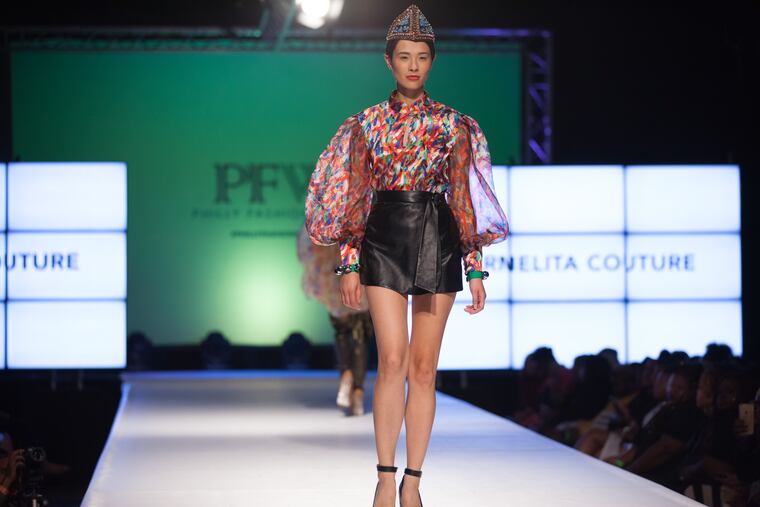Philadelphia is not a fashion destination because we don’t take fashion seriously. Perhaps that’s about to change. | Elizabeth Wellington
The goal of the Philadelphia Fashion Garment and Industry Task Force is to advise City Council in ways that boost the local fashion industry. And perhaps within a few short years, we will come to respect fashion in our town the same way we do sports and food.

Fashion industry insiders spent nearly two hours at Philadelphia’s City Hall on Wednesday morning arguing for our city’s fashion future.
The impassioned collection of 13 clothing retailers, fashion educators, event planners, and entrepreneurs spoke at a public hearing. The hope is that City Council will vote Thursday to establish the Philadelphia Fashion and Garment Industry Task Force and use it to help support the local fashion industry.
The larger hope is that within a few short years, we will come to respect fashion in our town the same way we respect sports and food.
How will this happen? Through supporting local manufacturing. There simply aren’t enough places where designers can affordably make their apparel.
“It’s about building small businesses and creating jobs that support the growth of our city,” said Kerry Scott, one of the cofounders of Philly Fashion Week. Scott and business partner Kevin Parker brought together the diverse group that includes Michelle Shannon, vice president of marketing in the Center City District; Nasheli Ortiz, Moore College of Art and Design’s fashion chair; and Farah Farag, marketing coordinator for the Fashion District Philadelphia.
It is going to be a tough sell. Because, as it stands, our city doesn’t understand — or respect — fashion.
As someone who has covered the local fashion industry for years, it always baffles me that although we get dressed every day, most Philadelphians don’t think that fashion applies to them. I get it. The industry has been so caught up in perfect models wearing perfectly tiny clothes that people believe that fashion is simply just an expensive fairy tale. The industry also has a long history of body shaming and a lack of diversity, so it’s no wonder we’d rather lounge around in yoga pants than dress to impress.
But fashion isn’t just about being exclusive and unattainable anymore. Today, fashion designers are hungry entrepreneurs who are making clothes for all bodies and who are concerned about the environment. These issues were largely ignored by the generation that came before.
Still, fashion connects business, the arts, and culture. It’s a form of self-expression. And, even if none of that matters to the city, fashion creates jobs. Necessary jobs. Jobs, that if created and properly supported, could be sustainable precisely because we get dressed every day.
If anyone can convince politicians, business leaders, and cynical city dwellers that fashion is an industry that is worthy of investment, it’s Parker and Scott. For more than a decade now, I’ve watched these young black men follow their own vision and tirelessly produce fashion shows brimming with diversity and creativity.
During Philly Fashion Week — which, by the way started Tuesday and will run through Sunday — they’re making fashion more inclusive by producing plus-size shows and streetwear presentations. They’ve also helped support local designers by connecting them to potential buyers.
But that will only take local makers so far. They need to be able to scale.
Scott and Parker can shine a light on our talent. But designers can’t make money if they can’t make their clothes. And as it stands now, it’s darned near impossible for them to get clothing made in Philadelphia — not New York, not overseas, but here.
This dilemma was at the center of Wednesday’s hearing.
Rachel Ford, an entrepreneur behind Made Institute, which teaches sewing, summed it up well: Designers need to be able to make small batches of clothing close to home. That will cut down waste and maximize profits. “That is how this all translates to dollars and cents,” Ford said.
This is where the city can help. The task force is just the first step. How the city actually would encourage creating manufacturing facilities is still unknown. Councilmembers David Oh, Derek Green, Isaiah Thomas, and Katherine Gilmore Richardson attended the hearing, and seemed receptive to ideas like incentives. That’s a start.
It’s not enough, though. Because no one will rush to invest in a state-of-the-art manufacturing plant and pay the people who work there a living wage if we don’t respect the work of fashion, and what the industry could mean to this city.
Not because we want to compete with New York as the best-dressed city or we want Philadelphia to return to its former fashion glory.
It’s because we want entrepreneurs like Philly-based Mary Alice Duff of Alice Alexander to keep making clothes that fit all bodies. We hope that Nancy Connor of Smart Adaptive Clothing can continue to make shirts that fasten with Velcro so that people with cerebral palsy and other disabilities can have an easier time getting dressed. We want designers like Betsy Cook of National Picnic, Amy Voloshin of Voloshin, or Nicole Haddad of Lobo Mau to keep producing well-made pieces that are more environmentally sustainable.
This is the kind of fashion people who get dressed every day need.